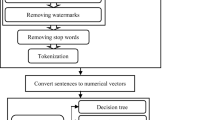Abstract
The sentiment analysis system is one of the most classic applications in natural language processing and enduring. The development of the mobile Internet has greatly increased people's participation, and everyone can make their own comments on social media platforms such as Weibo. Through public opinion mining and emotional analysis of text information, a rich potential value of information can be obtained. However, in the face of a large number of comment data, how is it more convenient for public opinion workers to see the whole picture and take timely measures? This is the practical problem to be addressed in this article. The main work of this article is to build a public opinion emotional analysis system about Jiangsu Police Institute, to realize the emotional analysis of the comments related to Jiangsu Police Institute in Weibo and post bar. Then related workers are able to screen out the comments of negative emotions. The experimental dataset in this article is a training dataset composed of positive and negative reviews selected from JD commodity reviews, and the test data are random reviews selected from the microblog of Jiangsu Police Institute. This article details the processing of the Chinese comment text dataset. Because Chinese text is involved, the data is first partitioned using the jieba participle. After the data pre-processing, we input the processed data into the Word2Vec model, and set the relevant parameters according to the formatting rules of the word2vec, so that the dataset of text can be quantized to facilitate code learning.
Access this chapter
Tax calculation will be finalised at checkout
Purchases are for personal use only
Similar content being viewed by others
References
Wei, S., Yue, F.: Considers the context of microblog short text mining: the method of emotion analysis. Comput. Sci. S1 (2021)
Balahur, A., Jesús, M., Hermida, A.: Montoyo: Detecting implicit expressions of emotion in text: a aomparative analysis. Dec. Supp. Syst. 53(4), 742–753 (2012)
Li, b., Zhou, X., Sun, Y., Zhang, H.: Research and realization of emotional analysis. Software J. 12 (2017)
Cortes, C., Vapnik, V.: Support-vector networks. Mach. Learn. 20, 273–293 (1995). https://doi.org/10.1007/BF00994018
Greco, F., Polli, A.: Emotional text mining: consumer analysis in brand management. Int. J. Inf. Manage. 51, 1–8 (2020)
Chao, Y., Shi, F., **aoling, W., Nan, Y., Ge, Y.: Analysis based on emotion dictionary extension technology. Small Microcomput. Syst. 04 (2010)
Shi, C., Xu, C., Yang, X.: TFIDF algorithm research review. Comput. Appl. S1 (2009)
Kim, D., Seo, D., Cho, S., Kang, P.: Multi-co-training for document classification using various document representations: TF-IDF, LDA, and Doc2Vec. Inf. Sci. 477, 15–29 (2018)
Pasua, S.T.S.N.: Deep learning-based thai emotion analysis: comparative study based on word embeddings, pos-tag and affective characteristics. Cities and Society, p. 50 (2019)
Tang, M., Zhu, L., Zou, X.: Based on a word2vec document vector representation. Comput. Sci. 06 (2016)
Li, H., Zhang, L.: Deep learning based text sentiment analysis during epidemic. Int. Core J. Eng. 7, 467–472 (2021)
Su, X., Meng, H.: Based on neural network. Comput. Technol. Dev. 12 (2015)
Pang, B., Lee, L., Vaithyanathan, S.: Thumbs up: senti-ment classification using machine learning techniques. In: Proceedings of the ACL-02 Conference on Empirical Methods in Natural Language Processing-Volume 10, Stroudsburg, Association for Computational Linguistics, pp. 79–86 (2002)
Kumarawi, A.B., Wallamilawi, A.: Opinion mining and emotional analysis: task, methods and application. Knowl. Base Syst. 89, 14–46 (2015)
Asarmanik, D., Mohan, C.: Large movie review emotion analysis term word extraction based on the Gini exponential feature selection method and the SVM classifier. World Wide Web Internet, World Wide Web Inf. Syst. 20, 135–154 (2017)
Funding
The authors received no specific funding for this study.
Author information
Authors and Affiliations
Corresponding author
Editor information
Editors and Affiliations
Ethics declarations
The authors declare that they have no conflicts of interest to report regarding the present study.
Rights and permissions
Copyright information
© 2022 The Author(s), under exclusive license to Springer Nature Switzerland AG
About this paper
Cite this paper
Xue, J., Chen, Y. (2022). The Principle and Implementation of Sentiment Analysis System. In: Sun, X., Zhang, X., **a, Z., Bertino, E. (eds) Advances in Artificial Intelligence and Security. ICAIS 2022. Communications in Computer and Information Science, vol 1588. Springer, Cham. https://doi.org/10.1007/978-3-031-06764-8_3
Download citation
DOI: https://doi.org/10.1007/978-3-031-06764-8_3
Published:
Publisher Name: Springer, Cham
Print ISBN: 978-3-031-06763-1
Online ISBN: 978-3-031-06764-8
eBook Packages: Computer ScienceComputer Science (R0)




